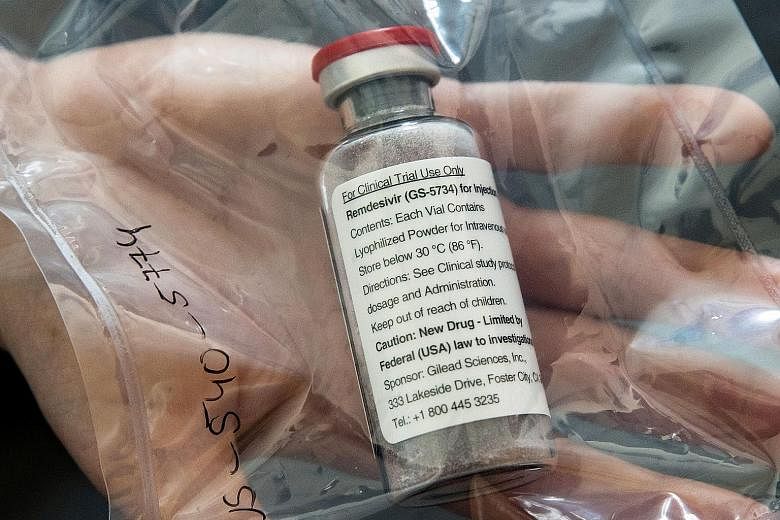In the race towards a cure for Covid-19, repurposing drugs for other diseases may benefit patients afflicted with the coronavirus.
Ebola drug remdesivir, for instance, was approved for emergency use in severely ill patients in the United States earlier this month.
A new study led by Singapore researchers has found that a combination of remdesivir with lopinavir and ritonavir, which are drugs used to treat patients with human immunodeficiency virus (HIV), could be 6½ times more effective at treating patients compared with just remdesivir.
Their research involved leveraging artificial intelligence (AI) to look for the best combination of drugs and dosage to treat Covid-19 patients.
The study was co-supervised by Professor Dean Ho, director of the N.1 Institute for Health and the Institute for Digital Medicine at the National University of Singapore (NUS). He said this could speed up the search for an interim treatment even as research continues for a Covid-19 drug or vaccine.
"Drugs on the market can be combined in various ways and in varying doses," he said.
"With AI, we can interrogate the entire universe of possibilities."
The IDentif.AI (pronounced "identify") platform used a pool of 12 carefully selected drugs - which have already been approved for patient use or are being evaluated in clinical trials - and combined them in various ways to see which yielded the best result.
The drugs include remdesivir, lopinavir and ritonavir, as well as malaria drug hydroxychloroquine, which has been touted by US President Donald Trump as having potential to be a Covid-19 cure.
More than 530,000 drug combinations were possible.
The remdesivir, ritonavir and lopinavir combination came out tops, said the researchers, who validated the findings using live virus in cell culture.
IDentif.AI also showed that hydroxychloroquine was relatively ineffective against the virus.
The results were published in a scientific paper pending peer review on pre-print site medRxiv earlier this month.
Prof Ho, who is also head of the NUS Department of Biome-dical Engineering, said that traditionally, drug developers look into how a drug works to get rid of the pathogen in the human body before determining if it could be successful against a new virus or bacterium.
Different drugs work in various ways. Remdesivir works by blocking a virus' ability to take over a human cell, said Dr Rishi Desai, an infectious diseases physician based in the US and a co-author of the latest study.
Lopinavir and ritonavir prevent large viral proteins from splitting into smaller ones, which keeps new viruses from leaving the infected cell. Hydroxychloroquine seems to prevent viruses from latching to a human host cell in the first place, Dr Desai added.
Prof Ho said identifying a drug that could be used to treat Covid-19 can be a laborious and lengthy process. Moreover, one drug could work to boost the activity of another.
IDentif.AI finds these unpredictable interactions, said Prof Ho.
For example, it had shown that the lopinavir-ritonavir combination was also relatively ineffective, a finding that echoed other clinical studies.
But there could be a synergistic anti-viral interaction among the three. "Relying solely on mechanism-of-action in drug development means that it is very possible to miss good combinations that could emerge," he added.
Dr Desai said: "The medications are attacking the virus in different ways, so it makes sense that when a virus takes a few different hits, it is more likely to get shut down."
IDentif.AI and similar AI platforms have already been used in drug therapy for cancer and other diseases.
Prof Ho said IDentif.AI narrowed down the range of options available to clinicians. This could help speed up the search for a drug suitable for treating Covid-19, and improve patient outcomes.
Associate Professor David Lye, senior consultant and director of the infectious disease research and training office at the National Centre for Infectious Diseases, Singapore, said the lopinavir-ritonavir combination has not been shown to work in patients with severe Covid-19, and that clinical researchers must first be convinced before the drug combination enters randomised controlled trials.
He added: "At this stage, treatment of severe Covid-19 remains high priority."












